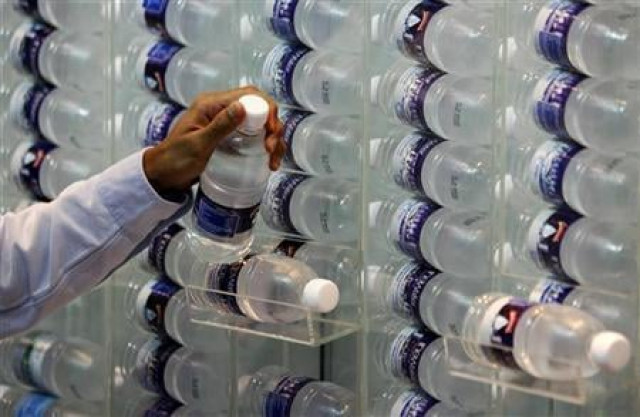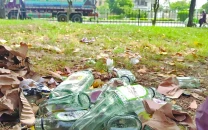SC warns to shut down mineral water companies
Gives one week to improve their system

A booth attendant displays a bottle of water. PHOTO: REUTERS
“In Khyber Pukhtoonkwa (K-P), the groundwater level has gone down from 300ft to 400ft and each year water level is going down by 100ft. In Karachi the situation is 1300ft, while in Punjab the canals water has dried up as the companies are using it,” Prof Siddiqui told a three-judge SC bench on Monday.
The scientist informed the bench, headed by the Chief Justice of Pakistan (CJP) Mian Saqib Nisar, that in Karachi the bottling companies are using water of the River Sindh after treating it.
The bench that was hearing a suo moto case on extraction of groundwater by water companies later directed all provincial advocates general and the owners of bottling companies to sit together and prepare a mutually agreed formula for water price.
Mineral water companies case: SC summons all four chief secretaries
The CJP said they would not allow water theft and the companies extracting groundwater would have to pay. He said people should boycott the bottled water.
Dr Siddiqui said 7.4 billion litre water is extracted by the companies every month. He suggested that if Re1 is charged per liter then Rs84 billion could be earned every year.
He also submitted a report of the commission, which observed that during the inspections, an astonishing fact transpired that two beverage companies– are using river water in their product.
Earlier, the apex court appointed a two-member commission comprising by Dr Siddiqui and Dr Farzana Altaf to inspect all the bottling plants. After evaluating these observations, the recommendations have been put forward by the commission for better water and environmental conservation.
The commission recommends that all the companies and plants may be directed to ensure execution of tree plantation under respective approvals that they have obtained or under their corporate social responsibilities. These companies should additionally plant 25,000 trees per annum.
“Laboratories in most of the beverages companies are functioning without well qualified and well-trained chemists and environmental specialists. It is recommended that the companies should hire personnel having at least MSc Chemistry and an environmental engineer for respective concerns.”
It proposed that most of the beverage companies are discharging their waste water with TDS less than 1200 ppm. “It is strongly recommended that this discharged water should be used for agricultural purposes rather than direct discharge in sewerage lines,” it says.
CJP expresses displeasure in mineral water case
During inspections, it was observed that concentration of minerals mentioned on the water bottle label were not accurate. Therefore, it is recommended that actual and accurate concentration ranges of water quality parameter must be displayed.
It says employees of Punjab Food Authority are on contract and not regularised yet and recommends that all employees of the authority may be regularised on priority basis. It is also recommended that food authorities of all the provinces must be trained on the model of Punjab Food Authority.
Special measures should be taken by all the companies to minimise the plastic waste generated by them through awareness campaign on print and social media.
“It was observed that one water bottling company is discharging RO project of TDS 42,000 ppm, which is very higher than the prescribed limit of TDS 3500 ppm, without any treatment.
“It is strongly recommended that the aforementioned company shall install salt recovery plant and Waste Water Treatment Plant (WWTP) as soon as possible. Until then, the company should submit its action plan within next 30 days,” it adds.



















COMMENTS
Comments are moderated and generally will be posted if they are on-topic and not abusive.
For more information, please see our Comments FAQ